Online Study Visit to North Macedonia
On 5 and 6 October 2020, an FMA Delegation of former MEPs led by FMA President and European Parliament Former President (2007-2009) Hans-Gert Pöttering participated in the first virtual Study Visit to North Macedonia.
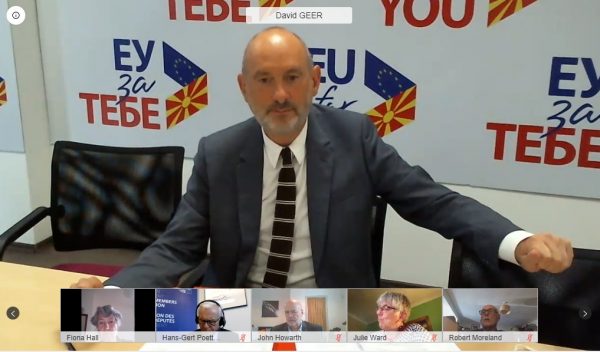 H.E. David Geer, EU Ambassador to North Macedonia, kicked the visit off with a briefing on the country’s political status quo after the recent elections, which was followed by discussion on topics such as human rights, EU accession, COVID-19, and EU economic support to North Macedonia, and co-operation in the region.
H.E. David Geer, EU Ambassador to North Macedonia, kicked the visit off with a briefing on the country’s political status quo after the recent elections, which was followed by discussion on topics such as human rights, EU accession, COVID-19, and EU economic support to North Macedonia, and co-operation in the region.
During the morning session, the delegation met Talat Xhaferi, President of the Assembly of the Republic of North Macedonia, who praised the work being done as part of the Jean Monnet Dialogues and added that North Macedonia very much welcomed the Berlin Plus Initiative. Dr Arbr Ademi, Chair of the Committee on European Affairs, and Dr Antonijo Milososki, Chair of the Committee on Foreign Policy, agreed that joining the EU could bring stability to the whole Balkan region. Dr Ademi in particular talked about North Macedonia’s history and described EU integration as a strategic goal which, when attained, would bring stability to the whole region. ‘Just as the EU members do, we need to put our differences aside and work together in the future,’ he said.
The North Macedonian Government’s representatives and the FMA members engaged in full and constructive discussions on topics such as relations with neighbouring countries, gender issues, church-state relations, small and medium-sized enterprises (SMEs), security, and the COVID-19 crisis.
In the afternoon, the delegation met representatives from 10 civil society organisations (CSOs) and a thought-provoking discussion was held. The following CSOs were present: Open Society Institute Macedonia, Macedonian Centre for International Cooperation, Institute for Democracy ‘Societas Civilis’, Helsinki Committee for Human Rights, European Policy Institute, Centre for Civil Communications, Institute for Human Rights, Centre for Legal Research and Analysis, Citizens Association MOST, and Macedonian Institute for Media.
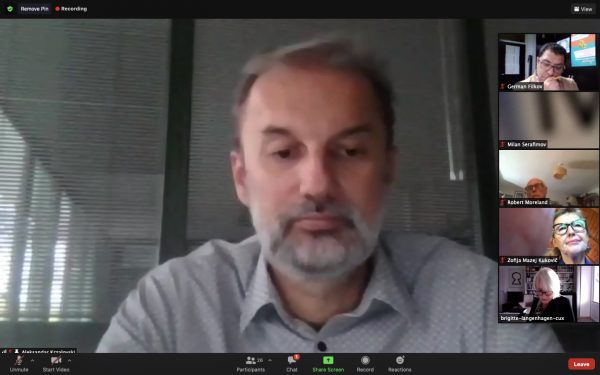 Aleksandar Krzhalovskifrom the Macedonian Centre for International Cooperation explained that protests beginning in 2016 had led to early elections and brought the current government into power, breaking with a past of absolute immunity, abuse of power, and chaotic relations with the political elites. Members of the new government, many of whom have come to politics from grassroots movements, have shown themselves to be more cooperative in an effort to create new policies and reform the country’s institutions. One example was the amendment of North Macedonia’s Law on Audio and Audiovisual Media Services, which is now largely in line with European and international standards on audiovisual media.
Aleksandar Krzhalovskifrom the Macedonian Centre for International Cooperation explained that protests beginning in 2016 had led to early elections and brought the current government into power, breaking with a past of absolute immunity, abuse of power, and chaotic relations with the political elites. Members of the new government, many of whom have come to politics from grassroots movements, have shown themselves to be more cooperative in an effort to create new policies and reform the country’s institutions. One example was the amendment of North Macedonia’s Law on Audio and Audiovisual Media Services, which is now largely in line with European and international standards on audiovisual media.
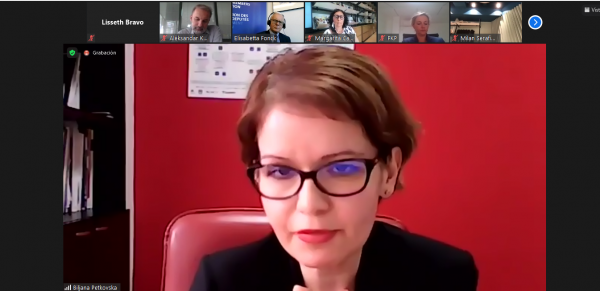 Nevertheless, a great deal of challenges still lie ahead, such as fighting corruption, ensuring that citizens are well informed, and restoring public engagement. Just like many other countries in the world, North Macedonia too struggles with fake news’ – or rather ‘disinformation’ as Biljana Petkovska from the Macedonian Institute for Media prefers to call it, ‘because fake news is designed to harm’.
Nevertheless, a great deal of challenges still lie ahead, such as fighting corruption, ensuring that citizens are well informed, and restoring public engagement. Just like many other countries in the world, North Macedonia too struggles with fake news’ – or rather ‘disinformation’ as Biljana Petkovska from the Macedonian Institute for Media prefers to call it, ‘because fake news is designed to harm’.
The speakers explained that CSOs still largely depended on international capital, and called for a move towards more domestic funding. Zharko Hadji-Zafirov from the Centre for Legal Research and Analysis said that, in addition to financial support, what CSOs needed was moral support. The discussion also touched on issues such as minority rights, gender equality, and climate change.
At the end of the first day, the delegation met the Chair of the European Parliament’s Delegation to the EU-North Macedonia Joint Parliamentary Committee, Andreas Schieder, MEP. Mr Schieder talked about the issues that North Macedonia might need to tackle in order to become a member of the European Union, such as its relations with neighbouring countries and the polarisation present in its society. ‘It is in the interest of North Macedonia to make the necessary reforms,’ he said.
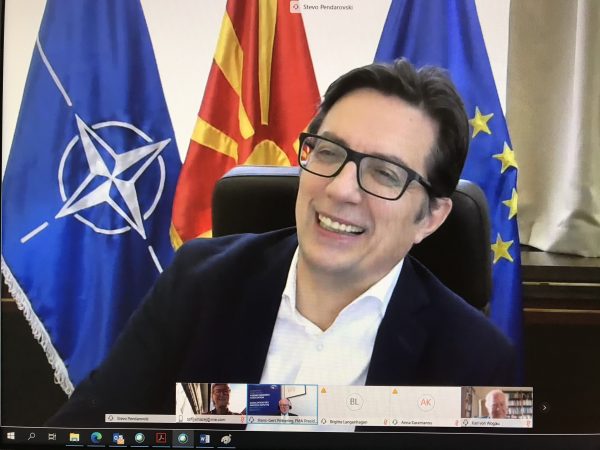 On the second day of the virtual study visit, the delegation met with North Macedonian President Stevo Pendarovski, Minister for Foreign Affairs Bujar Osmani, and Deputy Prime Minister for European Affairs Nikola Dimitrov.
On the second day of the virtual study visit, the delegation met with North Macedonian President Stevo Pendarovski, Minister for Foreign Affairs Bujar Osmani, and Deputy Prime Minister for European Affairs Nikola Dimitrov.
Mr Osmani explained that because of North Macedonia’s ongoing problems, in particular those with Greece and Bulgaria, the country was still not aligned with EU values and thus its membership criteria. He announced that he would visit Bulgaria’s capital to continue working on the relationship between the two countries, and added that North Macedonia’s ties with Greece had become much closer. He also said that North Macedonia represented a successful model for the entire region when it came to good relations among neighbours and an inclusive society for minorities.
President Pendarovski said that the process of becoming an EU member was still underway. Being without a government for almost a year and then having to postpone the elections in the wake of the pandemic didn’t do much to facilitate progress. He explained that now, a government was in place and that negotiations with the EU and with neighbouring countries could start. For President Pendarovski, these negotiations are crucial to give the Balkan countries a clear vision towards EU membership. ‘History connects us; it does not separate us’, he said, stressing the region’s shared history. He concluded by saying that North Macedonia’s accession would not just enlarge the EU, but complete it.
The last speaker from the North Macedonian Government was Nikola Dimitrov, Deputy Prime Minister for European Affairs. He emphasised that in order to become more attractive to the EU, North Macedonia needed to work on its relations with the other Balkan countries and said that priority in the EU accession budget should be given to investment in infrastructure to connect capitals in the western Balkans. He finished by saying that North Macedonia and Greece had begun a new chapter and that all that was left to do was to fill in the blank pages.
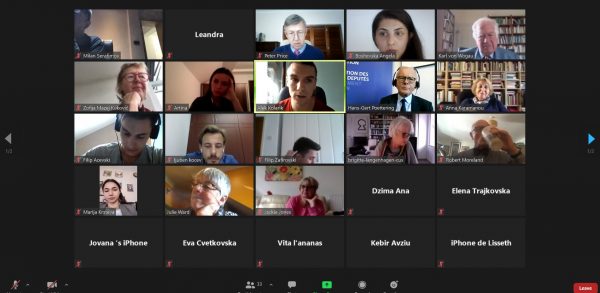 To round off the successful visit, the delegation met with university students from across North Macedonia. The students expressed their desire to become EU citizens and showed interest in a variety of issues such as fake news, the dispute between North Macedonia and Bulgaria, Brexit, and rule of law.
To round off the successful visit, the delegation met with university students from across North Macedonia. The students expressed their desire to become EU citizens and showed interest in a variety of issues such as fake news, the dispute between North Macedonia and Bulgaria, Brexit, and rule of law.
